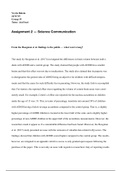Essay
Assignment 2 for Philosophy and Psychology year 2 - Vrije Universiteit Amsterdam
- Instelling
- Vrije Universiteit Amsterdam (VU)
This is my second assignment for this course in which I got a 10. Here is the complete and submitted version from which you can take inspiration and compare your progress to:)
[Meer zien]




